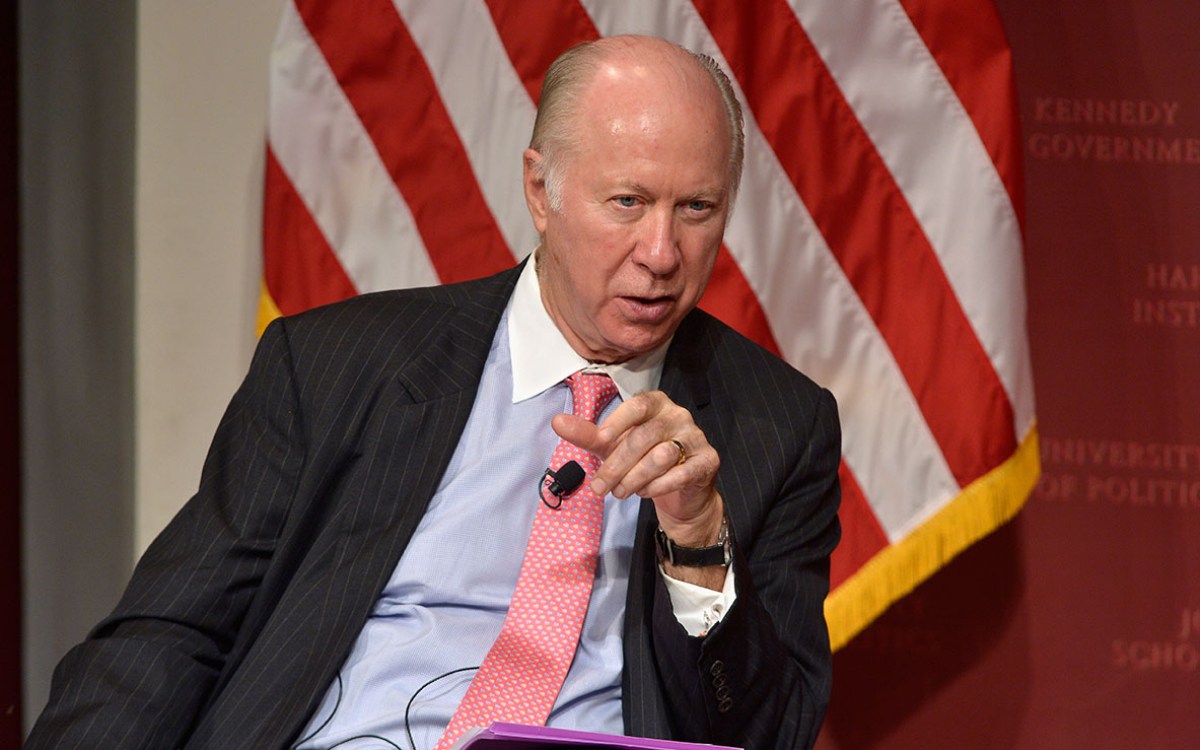Panel assesses the ‘power of unreasonable people’
There’s a desire for change, especially among the young, “a spirit sweeping across this country and indeed across the world,” said David Gergen, professor of public service at Harvard’s John F. Kennedy School of Government (HKS) and director of its Center for Public Leadership.
Gergen’s remarks at the John F. Kennedy Jr. Forum opened a panel discussion Monday (March 3) on social entrepreneurship and the power of what he called “unreasonable people.” The term referred to panelist Pamela Hartigan’s recent book, co-written with John Elkington, “The Power of Unreasonable People: How Social Entrepreneurs Create Markets That Change the World,” published by the Harvard Business School Press in February. Hartigan is managing director for the Schwab Foundation for Social Entrepreneurship.
Since the heyday of social activism in the ’60s and ’70s, characterized by charged anti-war protests and the impassioned Civil Rights Movement, experts agree interest in nonprofit work and civic engagement has waned dramatically.
A recent national study of 6,000 emerging nonprofit leaders by CompassPoint Nonprofit Services, The Annie E. Casey Foundation, the Meyer Foundation, and Idealist.org found the nonprofit sector could be in dire straits if it is unable to attract and keep talented employees in leadership roles.
After introducing the event, Gergen handed the moderating duties to his son, Christopher Gergen, a founding partner of New Mountain Ventures, an entrepreneurial consulting and leadership development firm.
For a definition of social entrepreneurship, the younger Gergen turned to panelist Stacey Childress M.B.A. ’00, lecturer in the General Management Unit at the Harvard Business School and co-founder of the Public Education Leadership Project at Harvard University.
Childress defined the term as “the pursuit of an opportunity to create pattern-breaking social change regardless of the resources you currently control.” Unlike other organizations in the social sector that focus on reducing the effects of a problem, she said, social entrepreneurs try to change the problem itself.
Social entrepreneurs develop new theories about the root cause of an existing problem, create organizations that can eliminate it, and adapt their strategies based on outcomes, said Childress, in an effort to “change the way the world works.”
In addition, she said, social entrepreneurs realize they can’t do it alone, and enlist the help of larger organizations to achieve their goals.
Young social entrepreneur Rebecca Onie ’98, J.D. ’03, executive director of Project HEALTH, a group she co-founded in her second year at Harvard as a pilot program in the Department of Pediatrics at Boston Medical Center, offered her own perspective. Her initial work included the creation of a help desk at the hospital to counsel families about nutrition and psychosocial needs.
Her model, said Onie, transformed “the way care is given on a day-to-day basis,” by addressing the nonclinical needs of families.
The organization has become a network of thousands of volunteers with six locations around the country.
According to panelist Leslie Crutchfield ’91, M.B.A. ’01, managing director for the Ashoka Global Academy for Social Entrepreneurship, a key strategy for the social entrepreneur is identifying points of leverage. Building relationships within the social sector and the business and policymaking worlds enables entrepreneurs to create change on a far greater scale. She cited the example of City Year, the corps of youth workers who engage in service to their communities.
The group, which began with one location in Boston and blossomed to 17 locations around the country and one in South Africa, has more than 9,000 graduates. Its creators helped push through national service legislation in 1993 that spawned a national service movement, noted Crutchfield.
“It took the founders of City Year … flying down to Washington, D.C., every week for many days at a time, putting their political capital, their social capital, their time, their money into moving that legislation.”
Getting the policy world to look to the nonprofit sector as a source of ideas for true innovation, said Crutchfield, was another piece of the puzzle.
Panelist Vanessa Kirsch, president and founder of New Profit Inc., agreed that developing political relationships and harvesting government resources is paramount for the nonprofit sector.
Kirsch, who helped found America Forward, a coalition of social entrepreneurs devoted to working with policymakers to effect change, was optimistic that the current election would bring about more support for civic engagement. The three top contenders for the presidency — John McCain, Barack Obama, and Hillary Clinton — she said, have all shown support for civic engagement and social entrepreneurship.
“For the first time ever,” said Kirsch, “all the candidates are talking about it.”
In the question-and-answer session, the panel acknowledged that more must be done to attract the next generation to the nonprofit sector. Colleges and universities are, panelists agreed, poised to take the lead. Strategies include encouraging students to consider civic engagement work as a viable career, forgiving loans for students taking nonprofit jobs, and supporting better on-campus recruitment resources for interested students.
“We do have a responsibility,” said Childress, “that we haven’t fully embraced and realized yet.”




